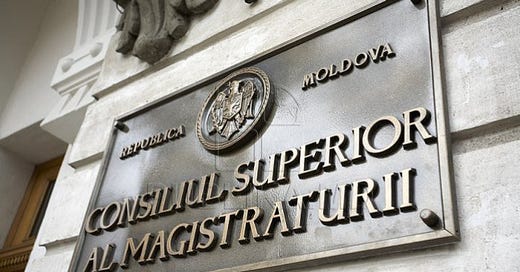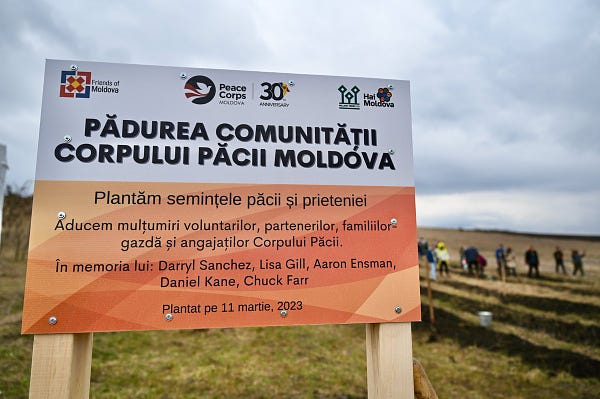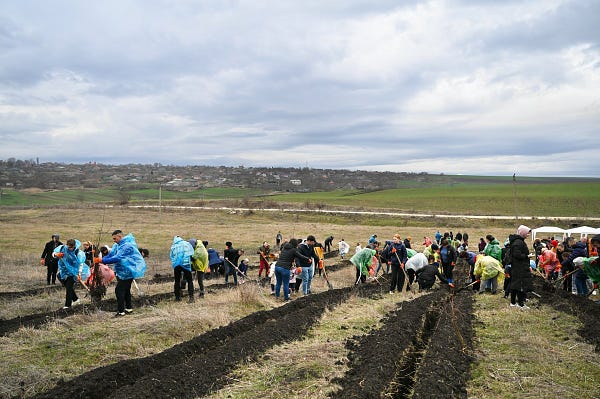Quick Note: Security and protest news dominated the headlines so we split the Weekly Roundup into 2 parts. Part 1 focuses on protests and security news. In Part 2 we’ll look at other political and economic developments over the last week.
Political Updates - the Socialist Party is showing Cracks
This week Socialist MP Alexandr Nesterovschi announced that he would withdraw from the Socialist Party. The MP will keep his seat in parliament as an “independent MP” but announced that he will be joining the “Movement for the People” - aka the Shor Party’s protest movement.
Socialist MP Vlad Batrîncea who serves as Deputy Speaker of Parliament and Executive Secretary of the Socialist Party responded saying "We are sorry that Mr. Nesterovschi gave in and he did not have the courage to present his position during the last meeting of the faction." He noted that over the last 8-9 months there have been multiple attempts to “buy” Socialist MPs and get them to change parties. Mr. Nesterovschi denied accusation of being bribed saying that the only way to defeat the PAS majority in parliament is to go out on the streets in a united opposition. It is worth noting that there is no “united” opposition protesting in the streets and that his move effectively puts him in the Shor camp.
Following the announcement, the Shor Party announced the names of 10 Socialist mayors from around the country who have also decided to switch allegiance to Shor.
In another major blow to the Socialists, PAS MPs passed the proposed language law in the second reading officially “recognizing” the national language as Romanian (not Moldovan) and beginning the process of updating all laws and regulations accordingly. This was done over massive objection by the Socialist Party which has long clung to the Soviet era “Moldovan language” label.
This is the second parliamentary defection from the Socialist Party after MP Gaik Vartanean left the party last year to join Ion Ceban’s MAN party. Mr. Vartanean voted for the law recognizing the language change to Romanian saying that it is time to put this issue to bed. Commenting on this, a Socialist MP called out his former colleague “For 10 years you have been telling everyone that the language is Moldovan.”
It’s too early to say if there will be continued defections from the Socialist party, but it seems likely that this is just the start. These 2 defections highlight options available to Socialists and a template for the likely political development of the opposition. Defectors joining the Shor Party are choosing a populist party under severe legal pressure but with clear Russian backing in the near term. Defectors joining Mayor Ceban’s MAN Party are choosing a nominally pro-EU party that is suspiciously made up of people who have spent their political careers opposing the EU and supporting Russia. The MAN Party most likely has more long term political viability than Shor, but it doesn’t pay as well right now (allegedly).
Justice Reform - Quiet Fights Spill into the Open
The government has been working steadily for the last year on an ambitious program to overhaul the judiciary by implementing vetting requirements to assure the integrity of judges and force corrupt officials out of the system. PAS and the government have gotten a lot of criticism because this process seems to be going extremely slowly - or not at all. This week a number of justice reform efforts spilled out into the public setting the stage for a number of upcoming political fights.
SIS Reform - Venice Commission says “Nope”
This week the Venice Commission, the EU’s highest Constitutional Law body rejected Moldova’s proposed reforms granting more powers to the Security and Information Service SIS. The body said of the proposals for new powers and investigative responsibilities that they are:
"very broad and vague powers without explanation of their legal consequences or sanctions."
and that they
"lack of a clear distinction between activities carried out within the framework of security measures and activities in the context of a criminal investigation."
The reforms were meant to strengthen SIS’s position as a hybrid of the FBI and CIA encompassing espionage, counter espionage, law enforcement and explicit anti-corruption powers. The Venice Commission also does not like parliamentary oversight of SIS proposing an “independent group of experts” should instead provide oversight.
Author’s Note: Few would argue that the “independent experts” that ran the CIA and FBI as personal fiefdoms before congressional oversight was established did a great job. The Venice Commission decision is notable in that it is highly consistent with the body’s previous recommendations that frequently go against political control of agencies or appointments and seeks outside “experts” appointed by byzantine processes. More than one of these bodies has been hijacked in the past (by Plahotniuc and others) which is how we got to this point in the first place (and partly why we still have no General Prosecutor a year and a half after the last election).
Responding, SIS representatives noted that "Moldova is facing a hybrid, non-standard war that requires an unconventional approach." But they promised to take into account the recommendations from the Venice Commission and return to Parliament with an amended law. For now the bill has been shelved pending amendments.
Judicial Reform Faces Major Pushback from Judges
Parliament’s moves to reform the judiciary have begun to encounter serious pushback from the judiciary. Firstly, this week it was announced that pre-vetting of new candidates for the Superior Council of Magistracy (SCM) did not go very well. Of 28 candidates who submitted themselves to the pre-vetting process as candidates, only 5 passed the external evaluation committee. The SCM’s role includes responsibility for hiring judges, evaluating performance and taking disciplinary actions. The 28 judges who applied were (presumably) confident that they would pass the integrity checks of their personal wealth and properties. The fact that only 5 passed from this self selected group is not very good and does not bode well for the planned general “vetting” of all judges.
Following this announcement, 20 of the 25 judges on the Supreme Court of Justice (SCJ) resigned. The judges claim that they resigned in protest of the pre-vetting process. Legal experts have noted that the motivation might not be so clear. Pre-vetting for the SCM is the precursor to “vetting” whereby sitting judges will go through the same process. Experts speculated that the massive failure rate may have incentivized those who may themselves not pass, or are near retirement age already, to resign. Having resigned they retain their retirement benefits of 1/2 monthly salary plus a special pension of 17,000 lei / month. If they were to be pushed out in vetting these benefits would be gone.
Further complicating the picture, and perhaps incentivizing the mass resignation, parliament passed its reform of the SCJ in the first reading. This reform would reduce the number of judges and allow for appointments from outside the judiciary including law professors, prosecutors and other practitioners in the legal field. In practice, this further reduces space for the current judges on multiple fronts and likely had an effect on the choices to resign as well. Whatever the motivations, the SCJ is effectively “blocked” without enough judges to function.
Pre-vetting is already underway for new members of the court. 12 candidates who are not currently judges are being vetted. So far 2 have passed, 4 failed, 1 withdrew and 5 are pending.
No Supreme Court of Justice… and now no Superior Council of the Magistracy (SCM)
On March 17th a General Assembly of Judges was held for the first time since 2019. The primary item on the agenda was the selection of 4 of the 5 members of the SCM from among the pre-vetted list. This move is critical as the newly composed SCM will be required for moving forward with the general “vetting” process for judges. 330 of Moldova’s 425 judges attended the assembly assuring a quorum, but the meeting was not successful. Judges debated for 5 hours, often criticism the pre-vetting system and the government before adjourning with a plan to reconvene April 28th.
Judge Liliana Catan, who recently resigned from the SCJ in protest, spoke out against Prime Minister Recean’s statement that the 20 resignations were “sabotage” saying:
“Nonsense that we are engaged in sabotage… I would advise them to open a dictionary and look up what sabotage means. Today I am forced to leave because all, absolutely all the laws passed recently have been to the detriment of the judicial system, and I simply do not want to fight windmills. The law allows me to retire today with honor,”
She further blasted the pre-vetting process saying:
“I studied very carefully how our judges were tested, and how interviews were conducted with those who are not judges. Today I can say: "Shoot me, but I will not change my mind." This is a mockery, and this is a blatant fact. How can it be that in a state that claims to be democratic, a judge is so mocked?”
Amazingly, she spoke positively about the Plahotnuic period saying;
“He seized the state, but at least created a “candy wrapper” of legality for legislative amendments. Now we are talking about the open seizure of justice, whether you like it or not,”
Other judges complained about meager salaries for assistants and secretaries. One spoke of "Maslow's pyramid of needs" saying that the basic (financial) needs of the judiciary should be taken care of before demanding "integrity" from them.
MP Olessea Stamate, head of the Parliamentary Legal Commission commented saying:
“It’s like they didn’t know they were performing live and maybe being watched by citizens who already have little faith in justice,”
She further went on to lament the lack of courage from the judges who are not corrupt but didn’t speak up against an increasingly organized block seeking to hold up reforms.
President Sandu also had forceful comments after the failure of the meeting:
“Some judges naively believe that we will watch helplessly as they try to destroy the country. Because without justice it is impossible to develop the economy. You can't develop anything in this country if you don't have confidence that the laws will be followed and there is someone who makes sure that those who don't follow the law get punished,"
We will not allow this because we want the country to develop, so that people do not leave it, disappointed with what they see in the justice system, and especially because we do not want them to block the process of joining the European Union,”
President Sandu responded to the blockage of the SCJ and SCM by swiftly announcing a number of actions. Firstly, the President addressed parliament and called for the creation of a special anti-corruption court saying:
"Today we requested the Parliament to create the Anti-corruption Court, a specialized Court that will deal especially with big corruption, but also with judicial corruption. As long as we have corruption in the Judiciary, our efforts to fight corruption are in vain".
Further, the President called for a meeting of the Supreme Security Council on March 20th to address the issue saying:
“The General Assembly of Judges has postponed the appointment of members of the Superior Council of Magistracy (SCM). I understand that the judges nevertheless decided to block the purge of justice and continue to put obstacles in the way of restoring law in Moldova,”
Wow - that got heated fast
If that was your reaction to the justice news of the week, you wouldn’t be along. The process of justice reform, which has largely gone on behind the scenes, has now spilled out into an open war of words between the President, Government and Parliament on one hand, and the Judges on the other. Reform of justice is more than a goal of the PAS Party, it is almost the reason for its existence. In a party that is highly ideologically diverse, fighting corruption has been the uniting factor since before the election that brought them to power. The President and Prime Minister are highly unlikely to back down in any substantial way. The fact that judges are now in open opposition to reform means that this process is likely to get uglier in the near future.
Economic News
Here is a quick rundown of the key economic and economic policy headlines of the week:
Moldova’s E-Governance agency won an award at World Summit on the Information Society 2023 in Geneva Switzerland. The award was for the “Front-Office-Digitalization platform” that underpins MConnect, MPass, MPay, MNotify, and other e-governance tools used by citizens. Moldova was competing against highly developed economies such as Singapore and Germany making the recognition all the more prestigious.
WizzAir is now fully out of Moldova. The airline will offer a similar flight lineup from Iasi Romania. No other airline has changed schedules in Moldova.
The IMF completed a trip to Moldova with a promise of an additional $94 million in lending to Moldova. The money should be available to the country by the end of April.
Moldova’s GDP Declined 5.6% in 2022. The biggest decline was in agriculture followed by construction and real estate transactions. Both the IMF and Moldovan government had previously projected a 0% growth, with the World Bank having projected -1.5%. The reality was far worse than those projections. GDP was positive in Q1, slightly down in Q2, and then fell radically to -10.3% in Q3 and -10.6% in Q4.
Ending on a High Note!
Last weekend President Sandu and US Ambassador Logsdon joined the Peace Corps Moldova staff and former volunteers to plant 1576 trees. The event commemorated 30 years of activity of Peace Corps in Moldova with 1 tree being planted for each volunteer who has served in country. Friends of Moldova, an NGO of former Moldova Peace Corps Volunteers, also participated in the event. Their work supporting Ukrainian refugees in Moldova is ongoing - you can find out more information here.










Very interesting about the judiciary. How about the lawyers coming up through the ranks - how long until there will be a sufficient supply of judicial candidates who can pass the "vetting" process? If there's an anti-corruption court, even more legally-educated people will be needed soon, (quick, before the pro-corruption parties get re-elected.)
Any word on when Moldova will be a Peace Corps site again? I assume it's contingent on the Ukraine war. Glad the staff is still on board.